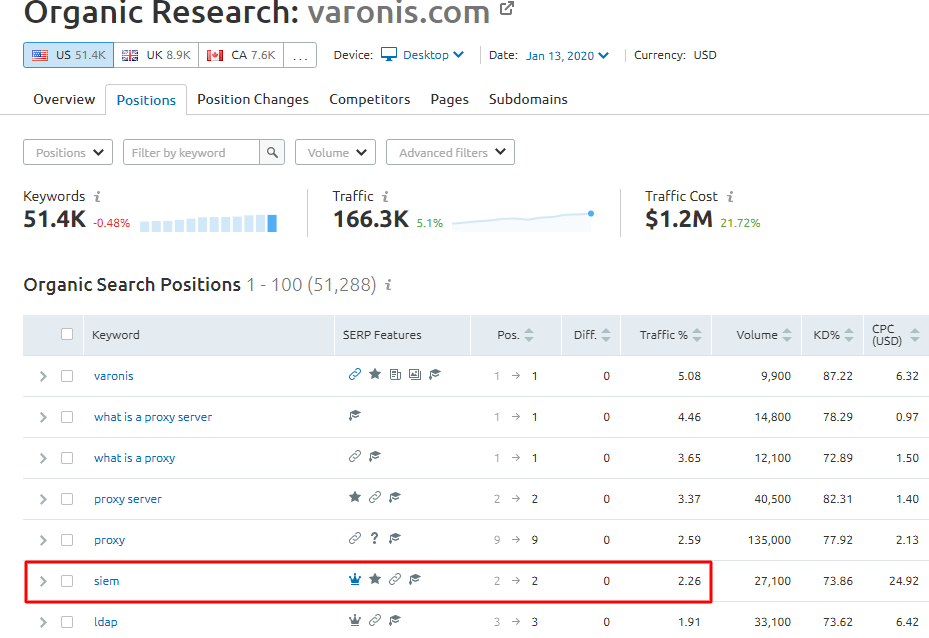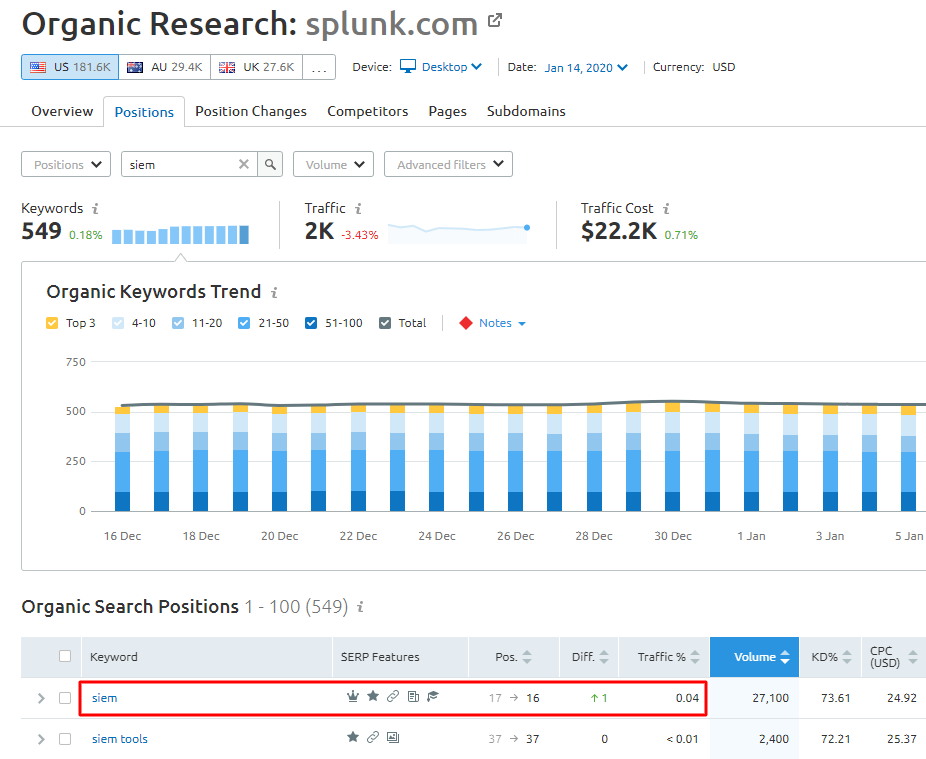We’re in the thick of “Awards Season”, and I can’t believe Adam Sandler didn’t get a nom…
Er…I want to talk about SEO!
In fact, I want to share a recent success story we had with a partner that led to them winning an award alongside winning more organic traffic and improved keyword rankings.
By sharing this case study, I’m hoping you’ll have actionable takeaways in the following areas:
- Keyword research and content strategy.
- Building successful SEO partnerships.
Let’s jump in!
Everything Starts with Keyword Research
As with most of our campaigns, the success of this project was built on a foundation of strong keyword research and strategy.
For proper keyword research, there are three main areas that need to be evaluated, including:
- Organic traffic and keyword rankings for your own website and content.
- Organic traffic and keyword rankings for your primary competitors’ website and content.
- Organic traffic and keyword rankings for content/search competitors (those who aren’t direct competitors, but compete with you for visibility in the SERPs).
The last bullet point here – analyzing search competitors’ keywords – is an important step that is often overlooked.
Even if a site does not sell similar products or services as you, but they compete for the same real estate in the search results, they are a search competitor and someone you need to pay attention to as you conduct keyword research.
As you analyze your site and competitor sites, you should be looking for the best opportunities to start ranking quickly.
Your best opportunities will be keywords and phrases that have relatively low competition – based on backlink numbers and the authority of ranking domains – and high search volumes.
A tool we like to use during keyword research is SEMrush, as it provides useful information such as:
- Sum of Traffic: This metric represents the total amount of traffic each keyword is responsible for driving to the given site.
- Sum of search volume: This metric reports the amount of monthly search volume for each keyword associated with a given URL or page.
- Average of Position: This metric communicates the average ranking position for a given URL or page regarding associated keywords.
Using Excel, you can filter this data to be more digestible and actionable.
For example, our client was a reputable brand who had established themselves as an authority within their space.
Since our partner already had a strong domain, we knew that if we could identify relevant topics that were driving organic traffic to competitors’ websites, there was a good chance we could create similar content for our partner’s site that would rank.
This was a particularly exciting strategy as it provided the double-whammy of increasing our client’s organic traffic by taking a bite out of their competitor’s visibility.
Keyword-Driven Content Is Results-Driven Content
Within Excel, we were able to filter competitor keyword data down to pages with top 20 rankings and analyze the associated keywords.
Through this process, we discovered that our partner’s competitors were driving a significant portion of their organic traffic with high-level, definitional content – we began creating similar content for our client immediately.
This strategy proved highly successful, as these pages quickly earned page one rankings and organic traffic:
Article #1: Published October 2019

- Ranking: #2 and #4 for head keywords
- 636 organic pageviews as of January 1st, 2020
Article #2: Published October 2019

- Ranking: #4 for head keyword
- 336 organic pageviews as of January 1st, 2020
Article #3: Published November 2019

- Ranking: #6 and #9 for head keywords
- 854 organic pageviews as of January 1st, 2020
And these are just a few examples of the pages we were able to create and the opportunities we capitalized on.
On aggregate, the gains we’ve been able to make for this client have supported an overall increase of ~50,000 monthly organic visitors.
This all demonstrates the power of keyword-driven content.
But how do you apply this strategy to your site?
Well, let’s use a real-world example: Splunk (no affiliation), an IT and cybersecurity software platform will be our example for this exercise.
If Splunk were trying to find ways to capture more organic traffic, they could analyze how their competitors are earning organic visitors, and one of their primary competitors is Varonis (also no affiliation).
For example, SEMrush reports that Varonis is driving 2.26% of their total organic traffic through a page targeting the keyword [siem]:

Considering “SIEM” is in Splunk’s title tag…

…I imagine this is an important keyword for them. However, their page targeting this keyword is ranking on Page 2 and driving considerably less traffic:

This is likely because Varonis’ page does a great job of defining what SIEM is, while Splunk’s page focuses more on its own products.
Splunk’s page does not appear to align with searcher intent. Just like with our client’s project, Splunk needs to create some high-level, definitional pages to improve their keyword rankings and capture more organic traffic.
Since Splunk shares a similar audience and is more authoritative in the space (DA of 73 versus Varonis’ DA of 61), it’s reasonable to believe they could build a similar, higher quality page that would rank well and garner keyword rankings and traffic.
Conversely, if you’re on the other side of the coin – the less authoritative domain side – you can still apply this strategy.
However, you need to adjust your expectations and understand that rankings will be harder to come by and you will likely have to work twice as hard in terms of link building and promotion.
Keyword research provides the blueprint for your content strategy, showing you where the best opportunities exist.
Once you know what questions your audience is asking and which types of pages best answer those questions, content creation becomes easy!
Teamwork Makes the Dream Work
The keyword-focused content we have created for this client has been highly effective in terms of achieving keyword rankings and earning organic traffic.
However, this success is due to a team effort from both agency and client and would not have been possible without buy-in and collaboration from our partner.
This is a critical point and if you only have one takeaway from this article, I want it to be this: Successful SEO cannot be siloed.
There must be true partnerships, collaboration, and trust between all teams involved in the marketing of a website (whether that be agency and client, in-house SEO team and in-house content team, an individual responsible for SEO and the rest of the digital marketing team, etc.).
Regarding our project, collaboration manifested itself in the form of training and educational materials provided by the client that enabled us to create more technical, “how-to” style content that has been integral to the success of their blog.
In fact, not only has this client garnered attention in search, but other marketers have taken notice too as they were recently nominated and won awards based on the quality of their content!
None of this would have been possible if we were isolated, working in a silo. Instead, we collaborate often, strategize together, and work toward a shared goal to achieve tremendous results.
I hope you can take the lessons learned here and apply them to your own campaigns to achieve similar success, and I hope you won’t be snubbed in the search results like Adam Sandler!
More Resources:
- How to Get Organic Traffic That Isn’t From Google
- How to Improve Your Keyword Rankings in Google
- 5 Easy SEO Wins with Powerful Results
Image Credits
All screenshots taken by author, January 2020

![Growing Organic Traffic by 50K Monthly Visitors with Award-Winning Content & Collaboration [Case Study]](https://www.searchenginejournal.com/wp-content/uploads/2020/01/growing-organic-traffic-by-50k-monthly-visitors-with-award-winning-content-collaboration-a-case-study-5e21b7064dd32.png)



